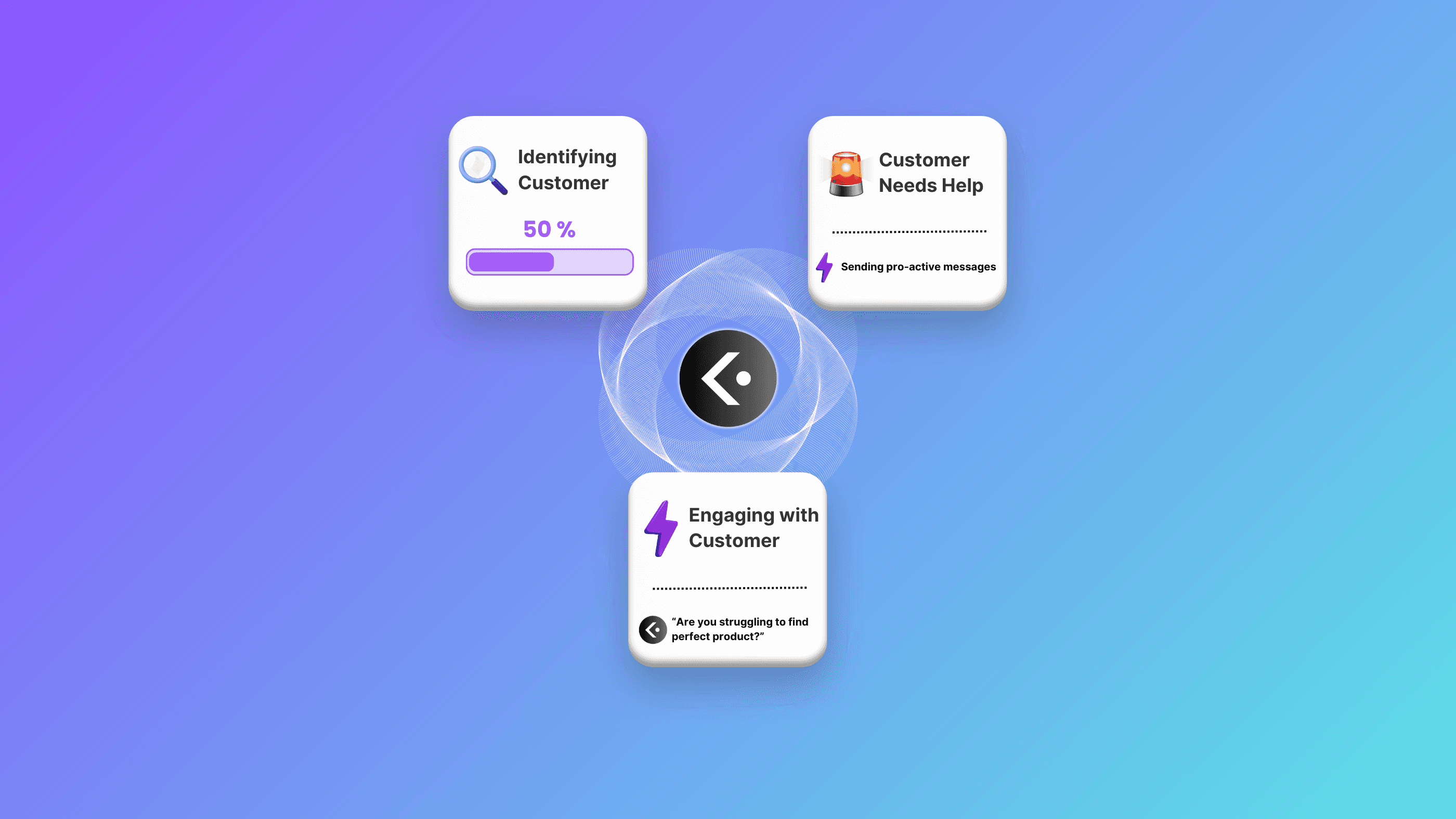TLDR: AI ecommerce assistants are helping online retailers and customers by saving money and providing convenience consecutively. Merchants can increase their conversion rate significantly by running AI-powered chatbots.
Guide to Building an AI Ecommerce Assistant [Step-by-Step]
AI is changing both the retail and customer shopping experience. AI automation makes every part of a customer’s online shopping experience to be more efficient. An IBM report shows over 50% of modern CEOs are integrating AI into the customer ecommerce journey while 43% rely on technology for strategy.
Search and discovery are everything in ecommerce and form the bulk of your customer journey. It also helps with personalization which enriches the shopping experience. When a customer visits an online merchant store, AI analyzes past purchases, browsing histories, and real-time behaviors while sharing a product list matching their interests. If a customer always buys sportswear from a merchant store, the search results will present new arrivals in the same category.
In this article, we shall look into:
AI ecommerce assistants defined
Benefits of ecommerce AI for merchants
Role of AI ecommerce assistants
AI-enabled shopping assistant technology
Challenges to AI ecommerce
How to install AI ecommerce assistant Lookfor.ai
The evolution of AI in ecommerce
Hold on to there first—
Are you interested in learning more about how to grow your ecommerce store? Look at the articles below:
So how can we define ai ecommerce assistant—
AI ecommerce assistants defined
AI ecommerce assistants are software or integrations utilizing artificial intelligence (AI), natural language processing (NLP), and machine learning (ML) to help in the customer shopping journey. It is a digitized comparison of a sales rep in a physical store, helping with customer support and streamlining the checkout process.
Now that we understand the definition. We can advance to the benefits
Benefits of ecommerce AI for merchants
AI technology is changing business as we know it. While adding it to a business comes at a cost, its ability to solve problems is worth it. Here are some of the benefits AI tools promise ecommerce stores online.
Available round-the-clock—as a digital sales rep, AI ecommerce assistants offer 24/7 support without closing down for the night,
Natural Language Processing—AI-powered assistants utilize NLP algorithms to understand and interpret customer inquiries and relay the most appropriate responses in their messaging.
Personalized recommendations—customer data such as browsing and purchase history, search queries, and demographic information will be analyzed to enhance the overall shopping experience.
Multilingual assistance—to appeal to the global market, AI assistants can adjust and chat with customers in their languages.
Scalability—ecommerce AI assistants can talk to many customers at once, helping businesses grow their support while spending less.
Now that you can see its importance, how about the role ecommerce chatbots play—
Role of AI eCommerce assistants
AI is changing how retailers do business. You can almost remember Bill Gates's words, ”They will utterly change how we live,” and everyone will have an AI-powered assistant at some point. Conversational AI helps create a relatable way for retailers to scale customer engagement. Here are some of the impacts of ecommerce chatbots.
Better customer experience
AI-powered solutions like chatbots enhance the business-to-customer relationship. A Gartner study shows overall customer satisfaction increases by 25% when AI is adopted in ecommerce. Customer data from the online shopper's behavior results in personalized recommendations. A seamless shopping experience lowers your chances of leaving abandoned carts.

Cross-selling and upselling
When cross-selling you are trying to get the buyer to pick up an additional product or service that can complement the one already in their cart. For example, when buying a GoPro camera, you can include a carrying case that is displayed in a product catalog right before checkout.
Upselling is where you suggest an upgrade or more expensive version of a certain product. For instance, a customer buying a GoPro Hero 10 might see suggestions for the Hero 11 upgrade which offers improved photo and video quality. AI solutions like Lookfor rely on the customer’s past purchases and browsing behavior to boost your sales revenues.
Saves times
Automated self-service provides product information, answers FAQs and knowledge base, or virtual shopping assistants to reduce the workload on your support staff. Small retailers who are budget-sensitive can maintain lean teams without compromising on the quality of service.

Seamless inventory management
Some AI assistants integrate with your inventory system or CRM in the backend, continuously running inventory checks. For example, when a customer asks about a certain product, the assistant will have information on its availability or details about wait times.
Now that you know the role AI assists play, what about we check out what makes it up?
AI-enabled shopping assistant technology
A combination of technologies is involved in the creation of digital assistants. Here are some of the technologies supporting AI shopping assistants and chatbots.
Natural language processing (NLP)
Helps shopping assistants understand and interpret human languages. Other NLPs are sentiment analysis, language modeling, name recognition, and text classification.
Machine learning (ML)
Algorithms run by ML train your shopping assistants on large data sets. ML algorithms identify preferences, patterns, and data correlations to give personalized suggestions.
Voice recognition
Some argue that voice-based recognition will replace text-based SEO, particularly in product discovery. Ninety percent of customers consider voice searches to be faster and more convenient than text searches. In 2025, the number of purchases made through voice assistants will rise to over $164 billion.
Cloud computing
AI-powered shopping assistants leverage cloud computing resources to achieve scalability and computational power. The cloud infrastructure helps process and analyze large volumes of data, and trains them on machine learning models while delivering accurate customer responses in real-time.
Hold on there—
What about the challenges faced by AI ecommerce?
Challenges to AI ecommerce
Adding an AI e-commerce assistant to a mobile app or website might face some problems just as with any new technology. The main areas people look at in AI are the pricing, compatibility, and functionality offered.
Here are some of the challenges we are alluding to:
Integration challenge—When AI chatbots are added to a website, there might be occasional technical complexities. While there are some no-code AI tools, most older AI models require at least some familiarity with the technology on a technical level.
Cost pile-ups—just like with any other technology, AI comes at a cost. Look at the cost of building, setting up, integrating, or installing this technology and align it with your company’s strategic goals and budget.
Data privacy—AI ecommerce assistants gather a lot of customer information in the background. This introduces a new level of privacy and security concerns.
Customer acceptance—turns out 44% of customers would rather interact with humans than AI according to HubSpot. For the merchant, the challenge is in training the AI assistant to be user-friendly rather than spit out canned responses in a robotic manner.
Improve the AI—ecommerce assistants are no different from other types of AI-powered software. For instance, the popular AI tool ChatGpt has improved from versions 1 to 4 as it got better. To meet customer needs, regularly update your AI assistant on user feedback and change business priorities.
Language and culture—it only makes sense for your merchant store if the AI assistant can understand and accurately respond to different dialects, accents, and languages.
The evolution of AI in ecommerce
AI in retail is growing by 24.4% every year and is expected to reach $24.1 billion by 2028.
Technology like generative AI is radically reshaping how people shop from enhanced customer interaction to personalized chatbots.
AI keeps improving over time and so do its capabilities. Some tools like Lookfor offers merchants live chatbots, personalized product recommendations, smart searches, and demand forecasting. What could be a better assistant for a business owner than one that boosts sales, enhances customer retention, and reduces costs?




